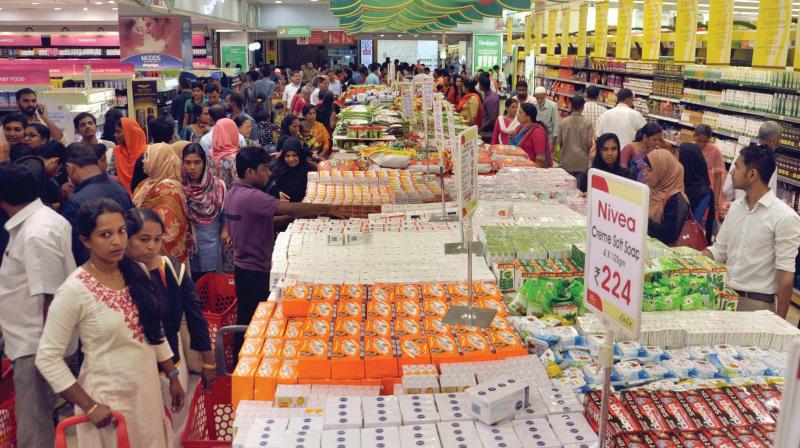GST launch: Chaos reigned supreme on Day 1
Across state, at least 25% of traders had downed shutters.

As anticipated, there was procedural chaos in trading centres across the state on the first day of the GST regime. Traders were confused about their existing stock but invariably goods and commodities were sold to customers at MRP rates fixed during the former VAT regime. Shop owners had no clear idea about how to bill existing stock, whether to use the new GST software or the earlier system.
There was also uncertainty about the compensation package offered to them for the sale of existing stock. At least 25 per cent of traders had downed shutters, and the rest restricted sales to a great extent. Sales had dropped by around 60 per cent on the day in traditional trading centres across the state, be it SM Street in Kozhikode or Chalai in Thiruvananthapuram. But shoppers' traffic continued unabated in big malls in Kochi. Wholesalers, both within and outside the state, had stopped supplies; in fact most wholesale stockists had stopped sales for the last 10 days.
CONFUSION ABOUT RATES:
There is utter confusion about how the GST will play out. "The price of most of our products will increase under the new tax," said Ms Raji Cherian who runs a paint shop in Chalai. The GST on paint, which had a VAT of 14.5 per cent, is 18 per cent. "But today we sold our stock at the MRP printed on the product. But since the GST is higher, we are told that the extra cost would be extracted from us," she said.
Truth is, many retailers have no clue about the new rates for the various products they sell. "We are just waiting for the new stocks to arrive to have a better understanding of the situation. The rate for many products can be got from the booklet they had distributed or from the net but we are not sure about the rates for some, for instance soft drinks that cannot be classified as either carbonated or fruit drink," said Paul David who runs a chain of bakeries in Kochi.
Mr David had closed his four shops for a week. Manikantan who runs Mony Stores, a perfumery outlet in Chalai, Thiruvananthapuram, had opened his shop on Saturday but sold only to his most loyal customers. "In our case, the prices of over 50 per cent of the products we sell ('pooja' items like incense sticks and camphor) have gone up. Today, I sold some products at MRP to people we know very closely. We are not sure how this will be billed," said Manikantan.
There is a huge information deficit. "My company is totally confused with the existing stock and how the GST is going to impact my bottomline," said Mohammed Jashir of the Raymonds outlet in Kozhikode. Since the GST on fabrics have gone up, he like most other traders in the state is unsure about how to dispose of his inventory. "Adding to the woes, our software has not been updated yet," he said. Even in shops where the software has been installed, they are unable to take print outs of the sale bill leading to noisy arguments with customers.
SMOOTH TRANSITION:
However, sectors like dry cleaners that do not have to worry about stock inventory can shift to GST right away. "Till June 30 we had a service charge of 15 per cent. But from today, though we have not yet got a provisional ID, we have charged 18 per cent GST,' said an employee of Snow n' White dry cleaners. They have gone ahead despite a lack of clarity. "When we called up the people concerned, we were asked to charge 18 per cent. “Our rate is not anywhere in the new GST documents. We have been asked to put 18 per cent in the assumption that were come under the category 'others' for which 18 per cent has been stipulated," the employee said.
BUSINESS AS USUAL:
Many traders but have found a way to bypass the fog that is now the new indirect tax regime. They sell their products in a pre-dated bill. Top Finance Department sources said many traders had not yet submitted the list of their inventory stock to the state government. They had to submit the stock details by June 30. There is a fear in the Department that inventory details, especially of commodities whose prices had gone up, could be tampered with so that it could be sold at a higher margin after two or three months.
Nonetheless, large malls that had changed their accounting software in a timely manner did not face any major hassles. Says M.A. Nishad, the director of Lulu Mall: "We have not faced any drop in customer response and there was a smooth transition to the new system. We have been preparing for the rollout for the past few days and everything went without any hitch." But, there were some delays connected with supply and deliveries, particularly from vendors belonging to the unorganized sector. "May be it would take a few more days for them to get into the system. We are not facing any delay from the organized sectors," he said.
But many individual traders with a provisional ID or a digital signature certificate hold on to it like dead paper. Mohammed Siddique, the owner of Grand Elite and one of the leading vendors of disposable items in the capital, said that it was not enough for him to possess a provisional ID. "The wholesaler in Tamil Nadu from whom I purchase these items, too, should have one. Otherwise I cannot get my input tax credit," Mr Siddique said. Incidentally, traders in Tamil Nadu have gone on strike against the GST.

